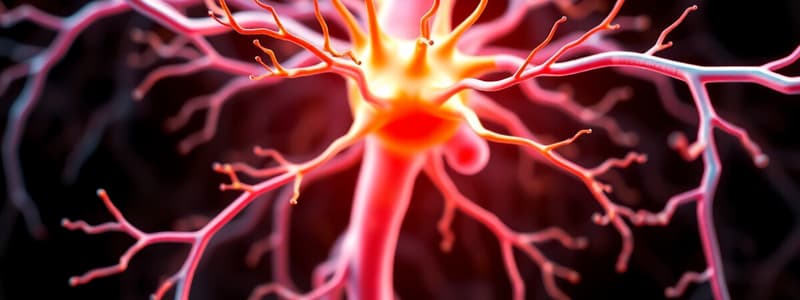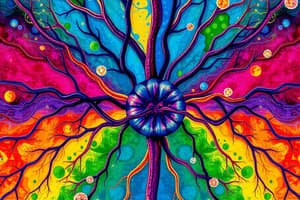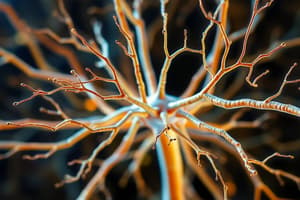Podcast
Questions and Answers
What is the primary function of the central nervous system?
What is the primary function of the central nervous system?
- Producing hormones
- Managing digestive functions
- Processing sensory information (correct)
- Regulating blood flow
Which part of the nervous system is primarily involved in voluntary movement?
Which part of the nervous system is primarily involved in voluntary movement?
- Peripheral nervous system
- Autonomic nervous system
- Sympathetic nervous system
- Central nervous system (correct)
What role do neurotransmitters play in the nervous system?
What role do neurotransmitters play in the nervous system?
- Storing genetic information
- Providing structural support to neurons
- Facilitating communication between neurons (correct)
- Producing energy for neural activities
Which of the following is NOT a component of the central nervous system?
Which of the following is NOT a component of the central nervous system?
Which structure is primarily responsible for processing and transmitting sensory information?
Which structure is primarily responsible for processing and transmitting sensory information?
What physical symptoms are associated with a lack of dopamine in the body?
What physical symptoms are associated with a lack of dopamine in the body?
Which condition is linked to unusually high amounts of dopamine in the body?
Which condition is linked to unusually high amounts of dopamine in the body?
What impact does dopamine deficiency have on motion control?
What impact does dopamine deficiency have on motion control?
Which of the following symptoms is NOT typically associated with low dopamine levels?
Which of the following symptoms is NOT typically associated with low dopamine levels?
In what way can high dopamine levels negatively affect an individual?
In what way can high dopamine levels negatively affect an individual?
What is the approximate number of unique neurotransmitters identified in humans?
What is the approximate number of unique neurotransmitters identified in humans?
What is the primary function of dendrites in a neuron?
What is the primary function of dendrites in a neuron?
What is a synapse?
What is a synapse?
How does a neurotransmitter primarily influence a neuron?
How does a neurotransmitter primarily influence a neuron?
What is the role of acetylcholine in the body?
What is the role of acetylcholine in the body?
What role does the myelin sheath play in neuronal function?
What role does the myelin sheath play in neuronal function?
Which of the following statements about neurotransmitters is true?
Which of the following statements about neurotransmitters is true?
How do nerve impulses transmit across a synapse?
How do nerve impulses transmit across a synapse?
Which function is NOT associated with acetylcholine?
Which function is NOT associated with acetylcholine?
Which of the following does NOT describe a way neurotransmitters can influence neurons?
Which of the following does NOT describe a way neurotransmitters can influence neurons?
Through which types of receptors does acetylcholine primarily work?
Through which types of receptors does acetylcholine primarily work?
What is one way that neurotransmitters are categorized based on their function?
What is one way that neurotransmitters are categorized based on their function?
What does the axon of a neuron do?
What does the axon of a neuron do?
Which statement about acetylcholine is incorrect?
Which statement about acetylcholine is incorrect?
Which of the following activities is influenced by acetylcholine?
Which of the following activities is influenced by acetylcholine?
What is the first requirement for a chemical to have an effect in a neuron?
What is the first requirement for a chemical to have an effect in a neuron?
What must happen when the neuron is active regarding the chemical?
What must happen when the neuron is active regarding the chemical?
Which of the following describes a requirement for the response of a chemical in the neuron?
Which of the following describes a requirement for the response of a chemical in the neuron?
Which statement is true about the presence of chemicals in neurons?
Which statement is true about the presence of chemicals in neurons?
What occurs to the chemical after it is released from the neuron?
What occurs to the chemical after it is released from the neuron?
Flashcards
Nervous System
Nervous System
A complex network of specialized cells (neurons) that transmit information throughout the body.
Neurotransmitters
Neurotransmitters
Chemicals that transmit signals across the tiny gaps between neurons (synapses).
Chemical Presence
Chemical Presence
The chemical must be created within the neuron or already exist there.
Chemical Release
Chemical Release
Signup and view all the flashcards
Target Cell Response
Target Cell Response
Signup and view all the flashcards
What are neurotransmitters?
What are neurotransmitters?
Signup and view all the flashcards
How many neurotransmitters are there?
How many neurotransmitters are there?
Signup and view all the flashcards
What does an excitatory neurotransmitter do?
What does an excitatory neurotransmitter do?
Signup and view all the flashcards
What does an inhibitory neurotransmitter do?
What does an inhibitory neurotransmitter do?
Signup and view all the flashcards
What does a modulatory neurotransmitter do?
What does a modulatory neurotransmitter do?
Signup and view all the flashcards
Neuron
Neuron
Signup and view all the flashcards
Dendrites
Dendrites
Signup and view all the flashcards
Cell Body
Cell Body
Signup and view all the flashcards
Axon
Axon
Signup and view all the flashcards
Synapse
Synapse
Signup and view all the flashcards
Dopamine
Dopamine
Signup and view all the flashcards
Parkinson's Disease
Parkinson's Disease
Signup and view all the flashcards
Schizophrenia
Schizophrenia
Signup and view all the flashcards
Dopamine Deficiency
Dopamine Deficiency
Signup and view all the flashcards
Dopamine Excess
Dopamine Excess
Signup and view all the flashcards
Acetylcholine
Acetylcholine
Signup and view all the flashcards
Nicotinic Receptor
Nicotinic Receptor
Signup and view all the flashcards
Muscarinic Receptor
Muscarinic Receptor
Signup and view all the flashcards
Acetylcholine Signaling
Acetylcholine Signaling
Signup and view all the flashcards
Acetylcholine Breakdown
Acetylcholine Breakdown
Signup and view all the flashcards
Study Notes
Central Nervous System & Neurotransmitters
- The nervous system in humans controls bodily functions and responses to the surrounding environment
- The nervous system comprises the brain, spinal cord, spinal nerves, and specialized sense organs
- Sense organs detect stimuli and convert them into nerve impulses, which are transmitted to the central nervous system
- Nerve impulses are electrical signals that travel through the peripheral nervous system to the central nervous system.
- The body contains approximately 1 trillion nerve cells, and 100 chemicals, called neurotransmitters, facilitate communication between these cells.
- The nervous system is divided into central (CNS) and peripheral (PNS) components
- CNS encompasses the brain and spinal cord
- PNS includes all nerves and sensory structures outside the CNS
- The PNS further subdivides into somatic and autonomic systems
- The somatic system controls voluntary skeletal muscle movements
- The autonomic system regulates involuntary functions like gland and smooth muscle activity
- The autonomic system further divides into sympathetic ("fight or flight") and parasympathetic ("rest and digest") branches
- A neuron, or nerve cell, has components like dendrites, cell body, axon, myelin sheath, and synaptic terminals that contribute to neuronal functions and communication
- Neurotransmitters are chemical messengers that transmit signals across synapses between neurons
- Synapses are junctions between neurons or between neurons and effectors (muscles or glands)
- Nerve impulses are transmitted across the synapse by chemicals called neurotransmitters
- Neurotransmitters bind to receptors on the postsynaptic neuron, initiating a response
- Neurotransmitters are classified into various categories:
- Excitatory: Glutamate, Acetylcholine, Histamine, Dopamine, Norepinephrine, Epinephrine
- Inhibitory: GABA, Glycine
- Modulatory: Various neuropeptides, hormones
- The four criteria for identifying neurotransmitters include:
- Synthesis within the neuron
- Release upon neuronal activity, triggering responses in target cells
- Exogenous application elicits similar responses in target cells
- Mechanisms for inactivation/removal after function completion
Introduction to the Nervous System
- Living organisms react to environmental changes (stimuli)
- An organism's reaction to a stimulus is called a response
- The ability to respond to stimuli is sensitivity, or irritability
Neurotransmitter Function
- Neurotransmitters influence neurons in three ways: excitatory, inhibitory, and modulatory
- Examples: glutamate (excitatory), glycine/GABA (inhibitory), neuropeptides/hormones (modulatory)
- Certain neurotransmitters, like dopamine, are crucial for various functions, including motivation and movement
- Others, like serotonin, play essential roles in mood regulation
Specific Neurotransmitters (and related info)
- Acetylcholine is involved in muscle movement, heart rate and memory. Deficiencies can manifest in major symptoms like forgetfulness and difficulty with daily tasks
- Dopamine is associated with pleasure, reward, and motor control. Parkinson's disease (and schizophrenia) is linked with abnormal dopamine levels
- Serotonin plays a role in mood regulation
- Norepinephrine and epinephrine are involved in the "fight or flight" response
- GABA and Glycine are primarily inhibitory neurotransmitters
- Endorphins are associated with pain relief and euphoria
How to Improve Acetylcholine
- Adapt to stress better by improving coping mechanisms.
- Balance blood sugar levels
- Use caffeine strategically
- Eat nutrient-rich, choline-rich foods
- Practice neuro-exercises (mental exercises to stimulate brain function)
- Cleanse the body. Get enough sleep
- Examples of choline-rich foods: Pastured poultry liver, grass-fed meats, grass-fed beef liver, pasture-raised eggs, wild-caught salmon, broccoli/cauliflower, rosemary.
Impact of neurotransmitter imbalances
- Parkinson's disease arises from the death of dopamine-producing brain cells leading to movement problems (shaking, difficulty moving)
Additional Notes
- The exact number of neurotransmitters is unknown, but more than 200 have been identified
- Neurotransmitters can act through different receptors. (e.g. muscarinic, nicotinic)
- Scientists initially thought synaptic communication was mainly electrical; Otto Loewi discovered chemicals called neurotransmitters.
Studying That Suits You
Use AI to generate personalized quizzes and flashcards to suit your learning preferences.




